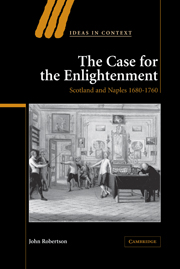Book contents
- Frontmatter
- Contents
- Preface
- 1 The case for the Enlightenment
- 2 Scotland and Naples in 1700
- 3 The intellectual worlds of Naples and Scotland 1680–c.1725
- 4 The predicament of ‘kingdoms governed as provinces’
- 5 Vico, after Bayle
- 6 Hume, after Bayle and Mandeville
- 7 The advent of Enlightenment: political economy in Naples and Scotland 1730–1760
- Conclusion: the Enlightenment vindicated?
- Bibliography
- Index
- IDEAS IN CONTEXT
1 - The case for the Enlightenment
Published online by Cambridge University Press: 15 October 2009
- Frontmatter
- Contents
- Preface
- 1 The case for the Enlightenment
- 2 Scotland and Naples in 1700
- 3 The intellectual worlds of Naples and Scotland 1680–c.1725
- 4 The predicament of ‘kingdoms governed as provinces’
- 5 Vico, after Bayle
- 6 Hume, after Bayle and Mandeville
- 7 The advent of Enlightenment: political economy in Naples and Scotland 1730–1760
- Conclusion: the Enlightenment vindicated?
- Bibliography
- Index
- IDEAS IN CONTEXT
Summary
By the end of the twentieth century, the Enlightenment was beleaguered. In the eyes of many philosophers as well as of a wider, educated public this eighteenth-century movement of ideas was still regarded as having laid the intellectual foundations of the modern world. By its confidence in the power of human reason, its commitment to individual freedom of expression against clerical or royal tyranny, and its optimistic assumption that these were the values that would improve the human condition everywhere, it was believed to have inspired and justified the nineteenth- and twentieth-century achievements of industrialisation, liberalism, and democracy. But this lay-philosophical view of the Enlightenment easily acquired another, darker face. For the Enlightenment was also charged with fostering ideals, of rationalism, universalism, and human perfectibility, to which could be traced the modern world's greatest evils. The charge was pressed particularly by those who held the Enlightenment responsible for the violence of the French Revolution, which followed so quickly upon it. In this perspective it was argued that Nazi genocide, Western imperialism, and Soviet communism all had their intellectual origins in the Enlightenment. Not surprisingly, it became increasingly fashionable to conclude that if this was where the Enlightenment had led the modern world, it was time to repudiate it, and to create a postmodern world on new intellectual foundations. The Enlightenment stood condemned as a misguided ‘project’ to establish a single, universal, rational standard of morality.
- Type
- Chapter
- Information
- The Case for The EnlightenmentScotland and Naples 1680–1760, pp. 1 - 51Publisher: Cambridge University PressPrint publication year: 2005



